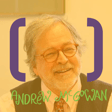
Sarah Drummond: Lead Systems. Lead Change. And Be Funny.
Is empathy in leadership overrated? Is it possible to lead gracefully in the face of annihilation? Is there anything that clergy can learn from stand up comedians?
Sarah Drummond, founding dean of Andover Newton Theological Seminary at Yale, led a campus relocation from Massachusetts to Connecticut, then led the comprehensive redesign of the seminary coursework, then led the school through COVID.
Dean Sarah gets real about how hard it was to foster community, protect her staff and students, and keep campus stakeholders engaged — from behind a web conference screen, then from behind a mask six feet away.
And, a frank talk about the future of Christian churches in the American spiritual landscape.
With lots of laughter and chat about stand up comedy along the way.
Content Warning: impacts of COVID, Christian hegemony, explicit language, white supremacy and medical racism, depression
Buy Sarah's most recent book: https://amzn.to/3IZSNw3
Check out Andover Newton Theological Seminary: https://andovernewton.yale.edu
Check out Sarah’s Medium site: https://sbdrummond.medium.com/
Check out Sarah’s website: https://www.sarahbdrummond.com/
Follow Andover Newton on Instagram: https://www.instagram.com/andover_newton/
Subscribe to Yale Divinity School on YouTube: www.youtube.com/YaleDivinitySchool
Check us out on Instagram and TikTok: @uncommongoodpod
Subscribe to our YouTube Channel: youtube.com/@uncommongoodpod
we chat to ordinary people doing uncommon good in service of our common humanity.
We are creating community that builds relationships across difference by inviting dialogue about the squishy and vulnerable bits of life.
thanks for joining us on the journey of (un)common good!





![BONUS: [moim] Gathering, David Rubenstein Atrium at Lincoln Center image](https://media.zencastr.com/cdn-cgi/image/width=112,quality=85/image-files/62b64321a33e0c0035b4bc2e/a5bd46bd-6072-4365-94bb-c1391a3e5105.jpeg)













